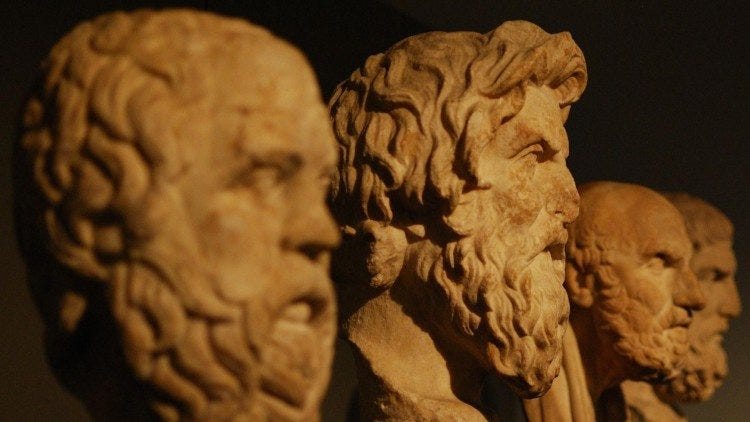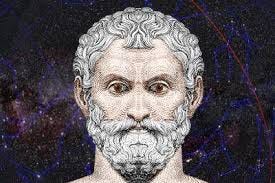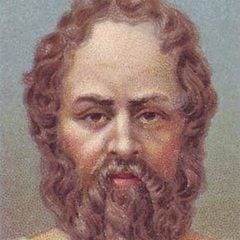In the Beginning Was Philosophy and The Earth Was Material
Introduction and Part One of the Series on Systematic Philosophy
Then the Lord God formed the man of dust from the ground and breathed into his nostrils the breath of life, and the man became a living creature.
— Genesis 2:7
Every story has a starting place. Our starting place with philosophy will begin with the early greeks and pre-socratics. My systematic study will evolve overtime as books and essays are included in the study I am about to present. At the moment, this is the literature review:
Literature Used (updated as I go)
A History of Philosophy Vol. 1 Pre-socratics to Plotinus, Frederick Copleston S.J. Ref (Copleston, V1)
Early Greek Science: Thales to Aristotle, GER Lloyd. Ref (Lloyd, EGS)
There will be instances of going back and forth as additional sources are added for the sake of context. The way I intend to develop this study is to use the following approach:
Historical Oriented
Ideas/Concepts, Cultures, and Individuals
Subject Specific
A book and/or paper on Idea, Culture, Person(s)
Philosophically Focused
A philosophically focused/directed book and or paper on the Ideas and Persons
Historical context is the central theme of study and through it we can then engage with specifics both the subject matter and the philosophical nature of that subject. Please bare with me as I am sure I will need to explain that more at another time.
The notes you are about see are in relation to the books mentioned. Some are quotes while others are of my own. Again, this will slowly evolve and grow as I pursue forward with this process.
The Pre-Socratics: Chapter 1 & 2, Copleston; Chapter 1, Lloyd
Early Ionian Philosophers
Place — Ionian, Greece
Society — Ionians
Facts: Ionian society preserved the spirt of older civilization of Greece; world of Homer; Achaean civilization
They did not conceive of an absolute beginning rather an eternity of all matter; hardly dogmatic materialists—the distinction of spirit and material was not developed or conceived fully or at all not sure.
Claim: Science began with the Greeks.
That claim holds on a few accounts—science is a behavior and a knowledge—the pre-socratic greeks did use a type of science, not the scientific method we know, but Thales of Miletus and those after him did two things: 1) Discovered or assumed a natural rather than only a supernatural occurrence of nature; 2) They were open to rational and critical debate over their discoveries (Lloyd, EGS, pp. 8-9)
Their behavior and knowledge set the foundation of Science
They highlighted 1) General rather than particular phenomena; 2) Natural rather than just supernatural (Lloyd, EGS, p. 9)
Still dogmatic, but practical as well in their willingness to uncover “the best explanation” (Lloyd, EGS, p. 12)
Thales of Miletus (The First Greek Philosopher)
Philosopher & Scientist
“Unity in Difference” there are a many different things, but a unity that brings them together
Set on discovering the underlying unity or “First Principle” of things
Water was according to Thales the ultimate element—the primary stuff of all things
Thales, like all Ionian philosophers, were materialists simply because they lacked a distinction between spirit and material; none existed in their mind or terminology
Reality is conceived as a material unity or Idea (in modern philosophical terms) i.e. objects are all made of material substances; tangible in form
Aristotle attributed to Thales, “all things are full of gods, the magnet has a soul because it moves iron”
Thales may have been holding on to a “Primitive animism” a concept of the “anima-phantasma (the shadowy double of a man that is perceived in dreams) came to be extended to sub-human organic life and inorganic forces”; however, there was also a transition of myth to science and philosophy as Thales practiced scientific work of the material world.
Note: Myth never really leaves us; facts and fiction I think tend to to share a common ground of reality
Anaximander (associate of Thales)
Constructed a map, possibly for sailors on the Black Sea, and led a colony to Apollonia
No single matter can be the ultimate element, like water, due to opposites—water vs dry, life vs death, etc—if there was a primary element that dominated the rest then there would be evidence of its dominance
Rather the primary element—Urstoff (the stuff)—is indeterminate; it is more primitive than the “opposites”
The primary element according to Anaximander was the Material Cause. According to Theophrastus, Anaximander was the first to call it such.
“It is neither water nor any other of the so-called elements, but a nature different from them and infinite, from which arise all the heavens and worlds within them.” It is the substance without limits. “Eternal and ageless… encompasses all the world.”
“Indeterminate boundless” or “Boundless Indeterminate” unlimited, infinite, or indefinite the origin of all things—rather than finite material opposites
There is a plurality of co-existent worlds which are innumerable though perishable, but there seems to be an unlimited number of them in existence at the same time, the worlds coming an eternal motion in which the heavens came to be. Pythagorean doctrine has similar ideas as seen in Plato’s Timaeus.
“Separating off” from the eternal motion a vortex was formed that created the world with heavier elements, earth and water, remaining in the centre of the vortex, fire going back into the circumference and air remaining in between. The earth is not a disc, but a short cylinder “like the drum of a pillar” (Copleston, v1, p.25).
Evolution: Life comes from the sear by means of adaptation to environment in the present forms of animals having evolved (Anaximander)
Note: From a purely material universe, it can only be reasoned that a source of organic life evolved from an animal lifeforms; species exchanges, etc.
Anaximenes (associate of Anaximander)
Assigned air as the main stuff of the universe; the ultimate element
“Just as our soul, being air, holds us together, so do breath and air encompass the whole world” — Anaximenes
Concept of Condensation and Rarefaction
Believed Earth was flat
Ionia was never able to accept the scientific view of earth
Like what you see? Please like, subscribe, share, and comment! Philo Rex is only getting started.








